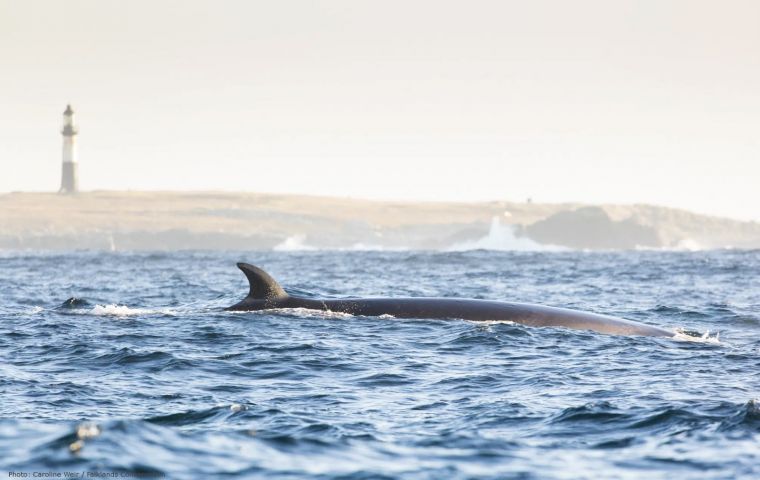MercoPress. South Atlantic News Agency
Sei whale breeding song identified for the first time in Falklands' waters
 A sei whale in front of the distinctive backdrop of Cape Pembroke. Photos: Caroline Weir
A sei whale in front of the distinctive backdrop of Cape Pembroke. Photos: Caroline Weir Acoustic research by wildlife charity, Falklands Conservation (FC), and the non-profit African Aquatic Conservation Fund (AACF), has revealed seasonal singing by sei whales in the Falkland Islands, documenting a breeding song display in this Endangered cetacean for the first time.
The work was published on November 9 in the Royal Society Open Science journal, by scientists Dr Salvatore Cerchio (AACF) and Dr Caroline Weir (FC).
Heavily decimated during the whaling era, the sei whale remains a modern-day enigma, rarely encountered in most parts of the world and with almost nothing known about its populations, ecology or behavior.
The coastal waters around the remote Falkland Islands are unique in hosting large numbers of sei whales in summer and autumn, and in 2021 the archipelago achieved global recognition as a Key Biodiversity Area due to its importance for feeding whales, including sei whales.
To learn more about why Falklands’ waters are so important for sei whales, the researchers deployed acoustic devices on the seabed to record their calls continuously over a two-year period.
This enormous dataset has resulted in the description of several new sei whale call types that had not been documented before, and will help whale scientists globally to identify the calls of this elusive giant during acoustic work in other geographic regions to learn more about its occurrence.
But of most surprise to the scientists, the recordings revealed an unexpected secret - the presence of song. These are not the classic melancholic tunes that we are familiar with from humpback whales, but rather a strange assemblage of swishes and whooshes that initially baffled the team.
Acoustician and lead study author Dr Salvatore Cerchio said “the sei whale songs are simply the most bizarre and unusual sounds I have ever heard from a whale. They are entirely other worldly.”
Co-author Dr Caroline Weir who runs the whale project in the Falklands continued “I received an excited call from Sal, who joked that the noises could be aliens and I should prepare to be beamed up!”
After eliminating the possibility of the sounds being created by aliens, other marine species, or human activities, the team concluded that they originate from the numerous sei whales that use the area.
This was confirmed by the presence of known sei whale calls emitted at the same time as the singing. What makes these songs, rather than just a mixture of strange noises, is their occurrence in organized and repeated phrase patterns.
“The discovery of a complex structured song for sei whales was truly a great surprise. The species has been studied elsewhere, but songs have never been reported before, which really highlights how special the Falklands are for this species” Dr Cerchio said.
Most current understanding of whale song comes from well studied species such as humpback, blue and fin whales, for which singing is thought to be a breeding display by males to attract females, or compete with other males. Dr. Cerchio and Dr. Weir believe this is the same for sei whales, with males starting to sing before they migrate to winter breeding areas.
“The characteristics of the songs and their seasonal timing – in the autumn, as migrations begin towards warmer breeding areas – makes it very likely that these songs are a male breeding display” said Dr Cerchio.
The discovery of sei whale song in the Falklands is another critical piece of information which feeds into their management and conservation, Dr Weir explained.
“In addition to being a globally-important feeding ground for the species, we now also have evidence that Falklands’ waters are one of few areas documented worldwide for sei whale breeding behaviors. This makes the Islands a really important location for monitoring the post-whaling recovery of the species in the Southern Hemisphere, and help ensure that whale numbers continue steadily increasing.” Falklands Conservation




Top Comments
Disclaimer & comment rulesCommenting for this story is now closed.
If you have a Facebook account, become a fan and comment on our Facebook Page!